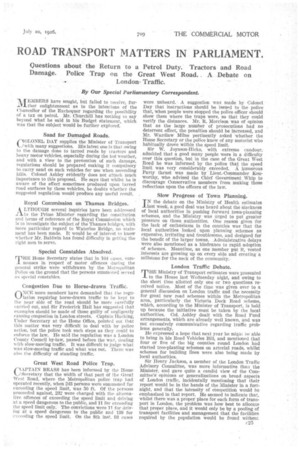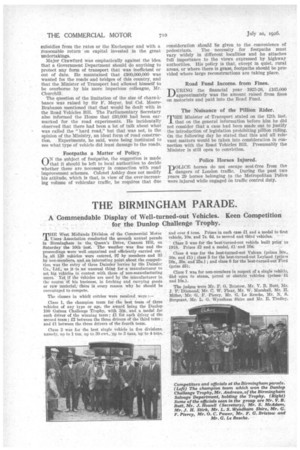ROAD TRANSPORT MATTERS IN PARLIAMENT.
Page 9

Page 10

If you've noticed an error in this article please click here to report it so we can fix it.
Questions about the Return to a Petrol Duty. Tractors and Road Damage. Police Trap on the Great West Road. A Debate on London. Traffic.
By Our Special Parliamentary Correspondent.
EMBERS have sought, but failed to receive; fur ther enlightenment as to the intentions of the Chancellor of the Exchequer regarding the possibility of a tax on petrol. Mr. Churchill has nothing to say beyond what he said in his Budget statement, which was that the subject would be further explored.
Sand for Damaged Roads.
COLONEL DAY supplies the Minister of Transport V./with many Suggestions. His latest one is that owing to the damage done to tarred roads by tractors and heavy motor vehicles, especially during the hot weather, and with a view to the prevention of such damage, regulations should be prepared making it compulsory to. carry sand on such vehicles for use when ascending hills. Colonel Ashley evidently does not attach much importance to this proposal. He says that whilst lie is aware of the effect sometimes produced upon tarred road surfaces by these vehicles, he doubts whether the suggested regulation would produce any useful result.
Royal Commission on Thames Bridges.
ALTHOUGH several inquiries have been addressed to the Prime Minister ,regarding the constitution and terms of reference of the Royal Commission which is to investigate the subject of the Thames bridges, with more particular regard to Waterloo Bridge, no statement has been made. It would be of interest to know whether Mr. Baldwin has found difficulty in getting the right men to serve.
Special Constables Absolved.
rilHE Home Secretary states that in 104 cases, sum
monses in respect of ,motor offences during the general strike were withdrawn by the Metropolitan .Police on the ground that the persons summoned served as special constables.
Congestion Due to Horse-drawn Traffic.
(-INCE more members have demanded that the regu
lation requiring horse-drawn traffic to be kept to the near side of the road should be more carefully carried out, and Sir Frederick Hall has suggested that examples should be made of those guilty of negligently causing congestion in London streets. Captain Hacking, Under Secretary at the Horne Office, pointed out that Ibis matter was very difficult to deal with by police action, but the police took such steps as they could to enforce the law. He said the regulation was a London County Council by-law, passed before the war, dealing with slow-moving traffic. It was difficult to judge what was slow-moving traffic and what was not. There was also the difficulty of standing traffic.
Great West Road Police Trap.
CAPTAIN BRASS has been informed by the Home Secretary that the width of that part of the Great West Road, where the Metropolitan police trap had operated recently, when 243 persons were summoned for exceeding the speed limit, was 50 ft. Of the persons proceeded against, 232 were charged with the alternative offences of exceeding the speed limit and driving at a speed dangerous to the public, and 11 for exceeding the speed limit only. The convictions were 11 for driving at a speed dangerous to the public and 139 for exceeding the speed limit. On the 8th inst. 93 cases
were unheard. A suggestion was made by Colonel Day that instructions should be issued to the police that, when people were stopped the police officer should show them where the traps were, so that they could verify the distances. Mr. R. Morrison was of opinion that as the large number of prosecutions had no deterrent effect, the penalties ,should be increased, and Mr. Wardlaw Milne pertinently asked whether the Home Secretary or the police knew of any motorist who habitually drove within the speed limit.
Sir W. Joynson-Hicks, with extreme candour, admitted that a good many people Were in a difficulty over this question, but in the case of the Great West Road he was informed by the police that the speed limit was very considerably, exceeded. A humorous Party thrust was made by Lieut.-Commander Kenworthy, who advised the Chief Government Whip to discourage Conservative members from making those reflections upon the officers of the law.
Slow Progress, of Town Planning.
IN the debate on the Ministry of Health estimates last week, a good deal was heard about the slackness of local authorities in pushing forward town-planning schemes, and the Ministry was urged to put greater pressure on those authorities. One reason given for the lack of enthuSlasm in the counties was that the local authorities looked upon planning schemes as expensive, irritating and troublesome, and designed for the benefit of the larger towns. Administrative delays were also mentioned as a hindrance to rapid adoption of schemes. Meantime, as one member put it, vested interests are growing up on every side and creating a millstone for the neck of the community.
London Traffic Debate.
THE Ministry of Transport estimates were presented to the House last Wednesday night, and owing to the short time allotted only one or two questions received notice. Most of the time was given over to a general discussion on London traffic and the necessity for great new road schemes within the Metropolitan area, particularly the Victoria Dock Road scheme, which, according to the Minister of Transport, is held up because the initiative must be taken by the local authorities. Col. Ashley dealt with the Road Fund arrangements, which are already well known, and was not excessively communicative regarding traffic problems generally.
He expressed a hope that next year he might he able to bring in his Road Vehicles Bill, and mentioned that four or five of the big counties round London had started tree-planting schemes on arterial roads, whilst schemes for building lines were also being made by local authorities.
Sir Henry Jackson, a member of the London Traffic Advisory Committee, was more informative than the Minister, and gave quite a candid view of the Cornmittee's opinions or generalizations on broad aspects of London traffic, incidentally mentioning that their report would be in the hands of.the Minister in a fortnight, and that the intensity of competition would be emphasized in that report. He seemed to indicate that, whilst there was a proper place for each form of transport in London, the problem was how best to allocate that proper place, and it would only be by a pooling of transport facilities and management that the facilities required by the population would be found without subsidies from the rates or the Exchequer and with a reasonable return on capital invested in the great undertakings.
Major Crawfurd was emphatically against the idea. that a Government Department should do anything to protect any form of transport that was inefficient or out of date. He maintained that 1300,000,000 was wanted for the roads and bridges of this country, and that the Minister of Transport had allowed himself to be overborne by his more imperious colleague, Mr. Churchill, The question of the limitation of the size of chars-hbanes was raised by Sir F. Meyer, but Col. MooreBrabazon mentioned that that would be dealt with in the Road Vehicles Bill. The Parliamentary Secretary also informed the House that 130,000 had been earmarked for the road experiments. He incidentally observed that there had been a lot of talk about what was called the "hard road," but that was not, in the opinion of the Ministry, an ideal form of road construction. Experiments, he said, were being instituted to see what type of vehicle did least damage to the roads.
Footpaths a Matter of Policy. ON the subject of footpaths, the suggestion is made that it should be left to local authorities to decide whether these are necessary in connection with road improvement schemes. Colonel Ashley does not modify his attitude, which is that, in view of the ever-increasing volume of vehicular traffic, he requires that due
consideration .should be given to the convenience of pedestrians. The necessity for footpaths must vary widely in different localities and he attaches full importance to the views expressed by highway authorities. His policy is that, except in quiet, rural areas, or where there is grass, footpaths should be provided where large reconstructions are taking place.
Road Fund Income. from Fines.
TILTRING the financial year 1925-26, 11650900 _Ll approximately was the amount raised from fines on motorists and paid into the Road Fund.
The Nuisance of the Pillion Rider.
MHE Minister of Transport stated on the 12th inst.
that on the general information before him he did not consider that a case had been made out to justify the introduction of legislation prohibiting pillion riding. On the following day he stated that this and all relevant matters would be taken into consideration in connection with the Road Vehicles Bill. Presumably the Minister is still open to conviction.
Police Horses Injured.
DOLICE horses do not escape scot-free from the dangers of London traffic. During the past two years 29 horses belonging to the Metropolitan Police were injured while engaged on traffic control duty.






























